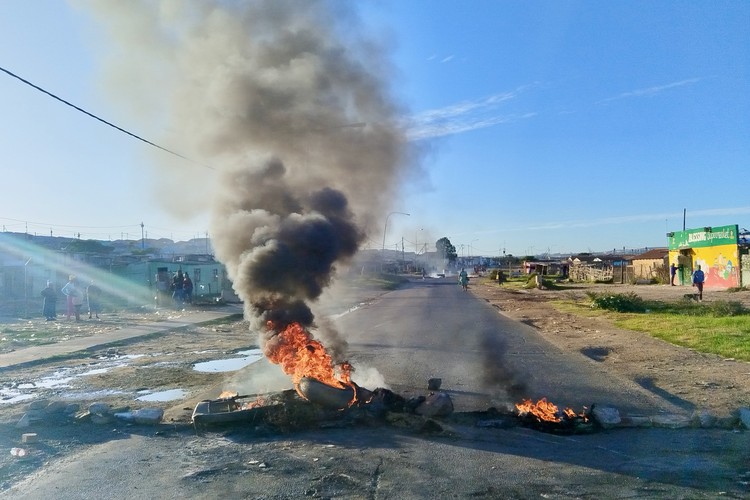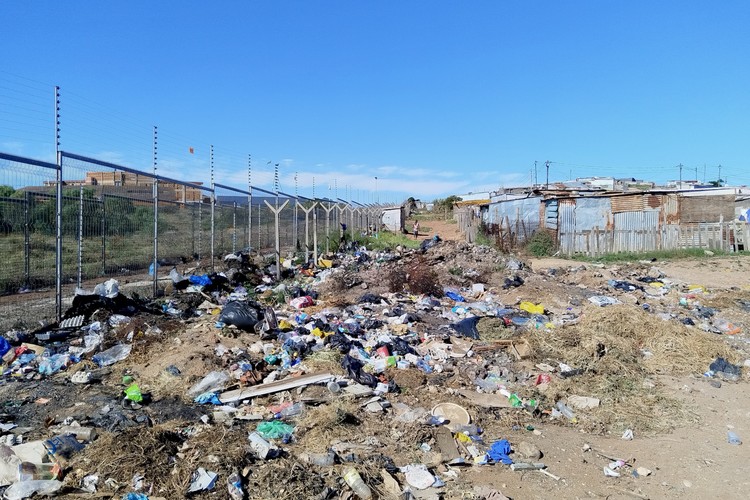Gqeberha shack dwellers demand houses after waiting 24 years
Nelson Mandela Bay Municipality promises serviced sites
Rolihlahla informal settlement residents blocked Old Uitenhage Road with burning tyres, storm water pipes and rocks on Thursday morning. Photos: Mkhuseli Sizani
- People living in shacks in Rolihlahla in Gqeberha protested on Thursday demanding houses.
- Established in 1999, the informal settlement lacks basic services.
- Construction of serviced sites started but stopped suddenly more than six months ago.
- At an urgent meeting called on Thursday, a community leader says the municipality promised to roll out more basic services and to start collecting refuse.
About 250 people from Rolihlahla informal settlement in Gqeberha blocked the Old Uitenhage Road with burning tyres, rocks and storm water pipes on Thursday morning. They were demanding houses.
On Monday, Rolihlahla residents had protested with people from Westville informal settlement because they said their bucket toilets had not been cleaned for weeks. Two vehicles were torched during that protest.
On Thursday, the protest was led by Rolihlahla residents who live at Vistarus and near the R75 Uitenhage Road.
Rolihlahla was established behind the Nelson Mandela University’s Missionvale Campus in 1999 by backyard dwellers from Missionvale, Zwide, Veeplaas, KwaZakhele and New Brighton.
About 280 RDP houses were built in 2004 for shack dwellers who had occupied land next to Missionvale Cemetery, but since then there has been no housing development, according to Linda Twelani, a community leader.
“This area is more than 20 years old and it lacks services. There are 581 households who have been waiting for service delivery since then,” he said.
He said hopes were raised during the Covid pandemic when there was talk of “de-densifying” and 150 bungalows were placed in an open field near the Uitenhage Road, 75 for households from Rohlihlahla.
“The 150 bungalow dwellers, including disabled families, share five toilets and one stand pipe. They have no electricity and their place is muddy on wet days,” said Twelani.
The 581 Rolihlahla households share 80 toilets, 30 of which have not been cleaned because the service provider’s contract was not renewed.
In April 2022, construction of a tarred road and repositioning shacks to serviced sites began but this “suddenly stopped in July without an explanation”, Twelani said.
“We don’t sleep on tarred roads. We need houses. I am getting old but I still live in a leaking shack,” said Dolly Ntonga, 68, who has lived in the area since 1999. “An RDP house would give me dignity because it comes with a flush toilet.”
Ntombizanele Gosani, who built her shack in 2008, said, “I have four pit toilet holes in my yard because every time it gets full, I dig a new hole. But now I have run out of space. We want houses because we cannot live like this forever. Rubbish is not collected and we burn it near the university’s boundary wall.”
Following the protests on Thursday, a delegation of community leaders met with mayoral committee member Ryno Kayser and Thembakazi Hlela, director of human settlements, according to Twelani .
He said they were told there are no housing plan for them, but they will get additional toilets and standpipes, electricity and for the first time refuse collection in Rolihlahla.
“They further promise that the repositioning of our shacks and completion of the tarred road will also resume,” he said.
Municipal spokesperson Mamela Ndamase, however, was quite unaware of the meeting. But she said, “Development processes are underway and houses will be built after the finalisation of such processes. Infrastructure has to be built first, which is what the municipality is busy with at this point.”
Rolihlahla residents dump their rubbish near the Nelson Mandela University fence because it is not collected.
Support independent journalism
Donate using Payfast

Don't miss out on the latest news
We respect your privacy, and promise we won't spam you.
Next: Here’s what the Zimbabwean embassy says about the expiry of the ZEP
Previous: Man who was dragged naked from his shack to sue City of Cape Town
© 2023 GroundUp. This article is licensed under a Creative Commons Attribution-NoDerivatives 4.0 International License.
You may republish this article, so long as you credit the authors and GroundUp, and do not change the text. Please include a link back to the original article.
We put an invisible pixel in the article so that we can count traffic to republishers. All analytics tools are solely on our servers. We do not give our logs to any third party. Logs are deleted after two weeks. We do not use any IP address identifying information except to count regional traffic. We are solely interested in counting hits, not tracking users. If you republish, please do not delete the invisible pixel.


